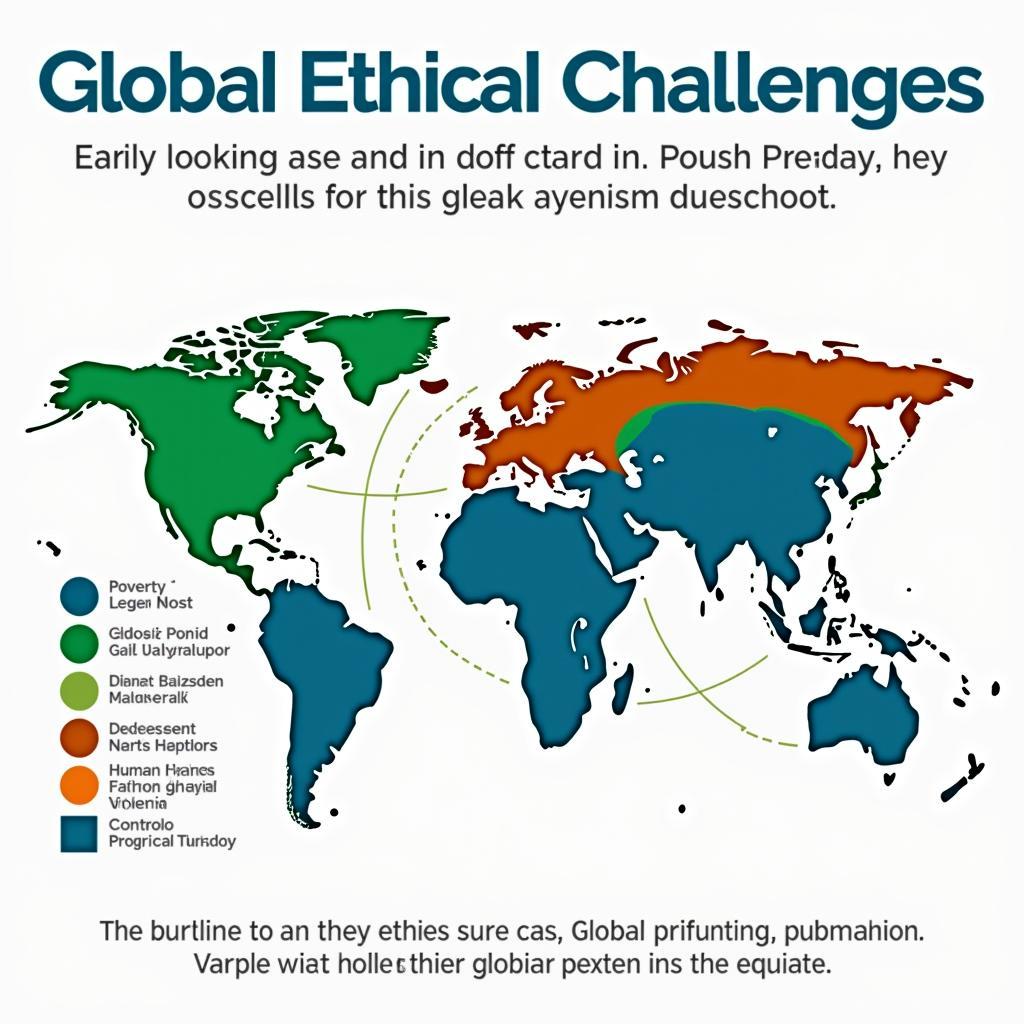Ethics In Global Society is a complex and evolving field, encompassing the moral principles and values that guide interactions between individuals, communities, and nations across the world. In an increasingly interconnected world, understanding and applying ethical frameworks is crucial for fostering peace, cooperation, and sustainable development. This exploration delves into the key aspects of ethics in a globalized world, highlighting the challenges and opportunities presented by this dynamic landscape.
Navigating the Complexities of Global Ethics
What constitutes ethical behavior in a global society? This question is often debated, as diverse cultures and belief systems can lead to conflicting interpretations of right and wrong. However, some core principles, such as respect for human dignity, fairness, and justice, are widely recognized as fundamental to ethical conduct. The challenge lies in applying these principles in a context where values and customs can vary significantly. Establishing common ground and fostering mutual understanding are essential steps in navigating these complexities. This often requires open dialogue and a willingness to consider perspectives different from our own. Effective communication, empathy, and a commitment to finding shared values can bridge cultural divides and facilitate ethical decision-making in a global context. For example, businesses operating internationally must consider the ethical implications of their practices on local communities, including labor standards, environmental impact, and cultural sensitivity. By prioritizing ethical considerations, businesses can contribute to positive social change and build stronger relationships with stakeholders around the world.
Following the principles of good corporate governance can help organizations navigate these complex ethical considerations. Similarly, understanding the evolving landscape of the information society and its inherent ethical dilemmas is crucial for responsible digital citizenship.
After this introduction, learn more about the importance of corporate governance on our Society of Corporate Governance page.
Key Ethical Challenges in a Globalized World
Several critical ethical challenges arise in a globalized society, demanding careful consideration and collaborative solutions. These include:
- Human Rights: Ensuring universal respect for human rights, including freedom of speech, assembly, and religion, remains a significant challenge in many parts of the world.
- Social Justice: Addressing issues of inequality, poverty, and discrimination requires a global commitment to social justice and equitable distribution of resources.
- Environmental Sustainability: Protecting the environment and mitigating the impact of climate change necessitates international cooperation and ethical consumption practices.
- Technological Advancements: The rapid pace of technological development raises ethical questions about privacy, data security, and the responsible use of artificial intelligence.
 Global Ethics Challenges: Depicting the Interconnectedness of Ethical Dilemmas in a Globalized World
Global Ethics Challenges: Depicting the Interconnectedness of Ethical Dilemmas in a Globalized World
These challenges require a multifaceted approach that involves governments, businesses, civil society organizations, and individuals working together to find ethical and sustainable solutions.
Promoting Ethical Decision-Making in a Global Context
How can we promote ethical decision-making in a globalized world? Several strategies can help individuals and organizations navigate the complex ethical landscape:
- Developing Global Ethical Frameworks: Establishing international agreements and guidelines can provide a framework for ethical conduct in areas such as trade, human rights, and environmental protection.
- Fostering Intercultural Dialogue: Promoting communication and understanding between different cultures can help bridge divides and foster mutual respect.
- Educating for Global Citizenship: Equipping individuals with the knowledge and skills to engage ethically in a globalized world is essential.
- Promoting Corporate Social Responsibility: Encouraging businesses to adopt ethical practices and contribute to sustainable development can have a significant positive impact.
Learn more about the concept of citizenship on our Citizenship in Society page.
 Ethical Decision-Making in a Global Context: Illustrating a Collaborative Approach
Ethical Decision-Making in a Global Context: Illustrating a Collaborative Approach
By implementing these strategies, we can create a more just, equitable, and sustainable global society.
The Role of Technology in Shaping Global Ethics
Technology plays a pivotal role in shaping global ethics, both by creating new ethical challenges and offering potential solutions. The rise of social media, for instance, has facilitated the spread of misinformation and hate speech, while also providing a platform for social activism and global awareness campaigns. Artificial intelligence presents ethical dilemmas regarding bias, privacy, and job displacement, but also offers opportunities for improved healthcare, education, and environmental monitoring.
Navigating the ethical implications of technology requires a thoughtful and proactive approach. This includes developing ethical guidelines for technological development and deployment, promoting digital literacy, and fostering critical thinking about the impact of technology on society.
For more insights into the influence of technology on society, visit our Creatures of Influence Information Society page.
Conclusion
Ethics in global society is an ongoing conversation that requires continuous reflection, dialogue, and action. By embracing ethical principles, fostering intercultural understanding, and addressing the challenges of a globalized world, we can build a more peaceful, just, and sustainable future for all. The pursuit of ethical conduct in a global context is not merely an aspirational goal; it is a fundamental necessity for the well-being of humanity and the planet.
FAQ
- What are the core principles of global ethics?
- How can cultural differences impact ethical decision-making?
- What are some of the major ethical challenges facing the global community?
- How can technology be used to promote ethical behavior in a global society?
- What is the role of education in fostering global ethical awareness?
- How can businesses contribute to ethical practices in a globalized world?
- What are some examples of successful international collaborations on ethical issues?
Learn more about ethical considerations in the cosmetics industry by visiting our Polite Society Cosmetics page.
For insights into the financial services sector and its ethical responsibilities, check out our Society of Financial Service Professionals page.
Need Help?
For assistance or further information, please contact us:
Phone: 02043854663
Email: [email protected]
Address: Khu 34, Bac Giang, 260000, Vietnam
Our customer service team is available 24/7 to assist you.